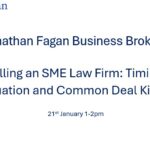
Please Don’t Get Ripped Off!
When selling a business, engaging a business broker who talks big figures, tells you about their huge network and how fast they can shift a business like yours sounds like the perfect option. However time and again we come across SME law firms in particular who have been stung by what appear to be astronomical fees from brokers. If a broker fails to sell a business and the firms attempt to move on, they suddenly discover they owe £000s in administration fees.
This article by Jonathan Fagan Business Brokers will explore how to avoid getting ripped off by business brokers charging high fees, offering alternatives and actionable tips to protect your interests. If you take away one piece of advice – read the contract and calculate the fee before you sign!
1. Understanding the Role of Business Brokers
Before looking at fee structures, it’s essential to understand what business brokers do. A reputable broker will usually do most of the following (depending of course what fee structure has been agreed):
- Value the business: Provide an accurate valuation based on market data and industry expertise.
- Market the business: Advertise to a wide audience using their networks and various platforms etc.
- Negotiate deals: Act as a mediator during negotiations, securing favourable terms for both parties.
- Guide through legalities: Assist with due diligence, documentation, contracts, and compliance with UK laws.
Many brokers genuinely add value, but issues arise when fees are disproportionate to services rendered.
2. Common Business Broker Fee Structures
Brokers typically charge fees in one (or more) of five ways:
- Upfront fees: Often labelled as “marketing fees,” these are charged before any service is delivered.
- Commission: A percentage of the sale price.
- Retainer fees: Monthly payments to retain the broker’s services until the sale is complete.
- Administration fees: if you end an agreement without a deal, the broker gets paid a percentage of their costs.
- Fixed fees: we charge these – buyers pay us a fixed fee if a deal occurs. Sellers can opt to pay for our premium services on the same basis.
3. Key Warning Signs of High-Fee Brokers
Obviously not all business brokers charging high fees are unscrupulous or out to rip their clients off, but there are clear signs to watch out for:
a. Exorbitant Upfront Fees
While some brokers may legitimately charge upfront fees for marketing, pre-sale services, extensive advice packages, valuations, deal structure advice, exit strategies and lots more besides, these upfront fees should be transparent and justified. A broker asking for £000s upfront without a clear breakdown of costs is a cause for concern. We have come across some brokers asking for between £10k and £15k in upfront fees just to start marketing a practice.
b. Commission Based on Turnover
When you sell a house you pay a fee based on the value of the house, with a lot of estate agents charging somewhere in the region of 1-2% of the sale price. So obviously with a business sale it would make sense for a broker fee to be a percentage of the value of the business being sold? Well yes, we get that. But a lot of brokers do not base their commission on the sale price. They base it on the turnover of the business being sold. We have seen percentages in the range of 5%-15% being applied.
Put this into perspective. If you have a law firm with a turnover of say £750,000 and 2 retiring partners, a chequered claims history, not a huge amount going for it and a buyer wanting to pay say £50k to take it over, a fee of even 5% of turnover would result in a whopping £37,500 fee to the broker. If you look at £1.5 million practice in similar circumstances, the same firm would be paying about £75k in broker fees.
Does this seem a reasonable deal? Do you think the broker has done enough work to justify this fee? Think twice before agreeing to paying commission based on turnover. We have seen countless examples of perfectly adequate deals turning into impossible problems because of commission based on turnover.
Do these brokers do anything at all different to other brokers? They might strike it lucky with a sale every now and then, but the buyers they have will be very similar to the buyers other brokers also have on their books and don’t charge such high fees to access.
We charge fixed fees which are agreed at the outset and have nothing to do with turnover. Our fees are based on how much work we think it is going to take to sell a particular practice.
c. Retainer Fees
We must start charging these. It is the perfect way to generate ongoing business without doing a lot other than updating a client. Why anyone would want to pay a broker retainer fees is beyond me, but we see them and it happens. Do you want to encourage your broker to sell your business, or keep you on as a paying customer to infinity and beyond?
d. Administration Fees
This is the one where you decide your broker is rubbish and not doing anything so you seek to end your agreement with them. At this point your broker sends you a bill for £15,000 plus VAT and points to clause 3.2c in your agreement with them.
As a broker I can see why other brokers have come up with this. Business brokerage involves a hell of a lot of churn. We get very poor quality buyers with no hope of ever purchasing a business making enquiries that will waste everyone’s time. We get sellers who fail to communicate, provide accounts or information when asked for it.
Charing administration fees to a seller who decides they don’t want to sell their practice anymore after we have spent hours sourcing buyers, getting good offers, preparing details, speaking to networks and promoting the business externally would be very satisfying – I for one would love to do this! However we also appreciate that this is part and parcel of brokerage work and people change their minds.
Read the small print, particularly with some of our close specialist competitors.. You have been warned.
e. Lack of Small Print
We have come across brokers who are very careful about not revealing their terms or skimming over restrictive exit clauses etc. Reputable brokers provide detailed contracts outlining services, timelines, and fee structures. Vague contracts or reluctance to provide written terms should raise immediate alarms.
f. Pressure Tactics
Believe it or not, there are brokers out there who act like double glazing salespeople and turn up at your offices, refusing to move until you sign an agreement. Bit of a red flag…
4. Research and Comparison: The Key to Avoiding Pitfalls
Ask for Case Studies
We could suggest reading testimonials on Google, but our experience over the last 20 years is that pretty much all our sellers and buyers want to stay anonymous. We can often get a good review for our valuations on an anonymous basis, we can also occasionally ask a seller to provide a new potential buyer with a testimonial. However a good broker will not have many reviews if any on google.
What is possibly a better option is to ask the broker for examples of experience of similar practices sold. We always have a bank of examples to give new clients.
5. Understanding Business Valuations
A common tactic among high-fee brokers is to inflate a business’s valuation to justify the charges. Overvaluation can result in prolonged time on the market and lots of frustration.
Get Market Valuations
Before engaging a broker, think about commissioning a market valuation. Market valuations give you real time figures rather than conjured up multiples of profit and turnover or EBITDA. Anyone can come up with a figure for a valuation, but if it is not backed up by evidence from recent sales it is probably a bit useless!
Our valuations never ‘big up’ a business. It is utterly pointless trying to tempt clients to list with us simply by opening their eyes to riches beyond their imagination!
6. Guaranteed Sales
Yes these really do exist! We had a client list with us recently who had been using another broker, who appears to have been in cahoots with a buyer. The broker was effectively guaranteeing a sale to all clients. This was almost a scam (but possibly not quite!) in that the buyer would make an offer well below market rates and then the broker would value the seller’s business accordingly and push the seller to go for the deal. There are unsubstantiated whisperings of the broker being connected to the buyer and benefitting financially from the deal as well as just their fee. No broker can ethically guarantee a business sale. Claims of “guaranteed results” are often marketing gimmicks designed to lure in sellers.
7. Final Tips for Avoiding High Fees
- Don’t Rush the Process: Take your time to research brokers and understand their fee structures.
- Ask Questions: Be direct about costs, timelines, and marketing strategies.
- Trust Your Instincts: If something feels off, it probably is.
- Keep Records: Document all communications and agreements with the broker for future reference.
Conclusion
Navigating the business brokerage landscape in the UK can be daunting, especially with the prevalence of a hell of a lot of cowboys and high-fee brokers. However, by understanding the role of brokers, recognising red flags, and taking proactive steps to protect yourself, you can ensure a fair and successful transaction. If you are selling a law firm or accountancy practice you could speak to us – we are honest, ethical, impartial as we can be and we charge fixed fees at all times that are always proportionate to the size of any deal.






